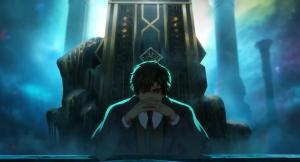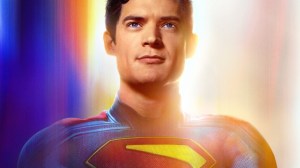Across a variety of platforms and networks, paranormal and cryptozoology enthusiasts have a number of different programs they can check out when it comes to learning more about Bigfoot, though most of these investigations end up being inconclusive analyses of “evidence” as hosts react in fear to any sort of commotion unfolding in a forest. At first description, Hulu‘s upcoming three-part Sasquatch might not sound all that different, but with Jay and Mark Duplass serving as producers, in addition to the series being directed by Lorena filmmaker Joshua Rofé, the new series is unlike any paranormal or true-crime investigation even the most esteemed viewer has seen.
Videos by ComicBook.com
While visiting a pot farm in Northern California in 1993, investigative journalist David Holthouse heard a story that still haunts him: on a nearby farm three men were torn limb from limb in a savage Bigfoot attack. Sasquatch follows David as he revisits the Redwoods 25 years later, in search of any evidence that might lead to the truth of what happened that night. As he pulls at the threads of this story, he’ll be taken down a path that’s far more terrifying than anyone would have imagined.
ComicBook.com caught up with Rofé to talk about developing the new series, the dangers he faced while filming, and if his belief in Bigfoot has changed.

ComicBook.com: I think a lot of audiences are going to wonder this, so before you set out to make this series, did you believe in Bigfoot?
Joshua Rofé: Patrick, you’re going to hate me. I promised myself I would not answer this question because I knew it was going to come up. Can I give you what I think is a better answer than just a yes or no?
Nope. I’m hanging up.
Okay. Hang up on me.
Even a more respectful answer to this idea of Sasquatch, yes or no, at large … so I went in 1,000% non-believer. All right? And then I was up in those woods, and this is something that David says in the series. When we were up in those woods, at a certain point, your phone has no service and the light is going down. There are no street lights, and you cannot hear any cars, because even though you’ve got your camera gear, you’ve hiked in quite a bit, and you can’t hear any cars. No one’s phone is going off, and it’s just you and the forest. And you start to hear things, you start to have heightened senses. For us, for me, specifically, what I’m pursuing here is a Sasquatch murder-mystery, a triple homicide, allegedly perpetrated by a Sasquatch or multiple Sasquatches.
All of a sudden, the woods become a spooky place, and I feel like I’m not alone out there. I know that my crew had a very similar experience. I was overcome with … I would say, sometimes as the director, you’re the one that tells everybody, “Okay. We’re done here. We’re done here. Let’s go. ” There were a couple of times where I thought, “I think we’ve stayed long enough, or we’ve overstayed our welcome. Let’s get out of here while everything is still good.” So I didn’t feel alone in the woods, at times, is I feel like the best I can do on that one, if that makes any sense.
Having been to Humboldt County and having visited those places and explored some of those forests, I totally understand the vibe those trees give off, not only the isolation you feel in the woods but also the isolation experienced by the people in those communities.
I remember David saying — I don’t think it ended up in the show, but we had interviewed somebody and we had been deep in the woods for hours, and it was the end of a long day, and we had a several-hour drive ahead of us. He said something to the effect of, “That’s the kind of place where when you’re in those woods, if all of a sudden you saw a Brontosaurus, you’d think, ‘Oh, of course, there’s dinosaurs here.’”
If your brain can compute that and square away with that, why wouldn’t there be a Sasquatch there? It’s like with aliens. There’s a tremendous amount of arrogance that tells us that we’re the only form of intelligent beings. It’s like, we don’t f-cking know anything. But yeah, you stay in those woods long enough and your perspective starts to shift, even if you were a hard no on Sasquatch existing.
Your last series, Lorena, might have been dismissed due to the absurdity surrounding what the public remembers about the Lorena Bobbitt case, only for that show to unravel just how infuriating the situation really was. I’ve seen all manner of true-crime series, but Lorena was one of the few that made me have to stop watching and walk away for weeks.
Oh, wow.
So for viewers of that series, who witnessed the domestic abuse you chronicled, Sasquatch feels like an unexpected and bizarre follow-up project. What was it about this case that appealed to you?
I think you bring up a really good point, and it’s something that my producing partner, Steven Berger, who produced both of those shows with me, one of the things that we talk about a lot is we love the idea of taking a household name or a word that everybody knows that is common knowledge and revealing something else about it, so you’ll never look at that same thing the same way again. And so, that’s what we tried to do with Lorena Bobbitt’s story, to re-contextualize her name.
And with Sasquatch, really, in many ways, I think it’s sort of the same thing, which is, it’s not just the Slim Jim commercials. Or what am I thinking? Jack Links? There’s a beef jerky commercial with that Sasquatch in it, and it’s not that. It’s actually, it’s something that has true terror and fear wrapped up in it.
February of 2018, I was making Lorena, and I was having dinner one night with a friend of mine, whose name is Zach Cregger. He’s one of the exec producers on this show. So obviously, you know where this story is going. His parting words to me that night were, “Oh, by the way, you should check out this podcast that I’ve been listening to. You’re either going to love it or think I’m crazy for loving it. And it’s called Sasquatch Chronicles.” Immediately I was like, “Oh, dude, I’m good. Thanks.” And he said, “I’m telling you, just listen to one episode.” And I said, “Yes, you have my word. I will listen to one episode.”
Next day, I listened to my first episode. And what the show is, it’s people calling in with their encounter stories, their Sasquatch encounter stories. Cut to the four days later, I’ve listened to 11 episodes. I’m in love with this show. Automatically, this is my favorite podcast, and the thing that I was so taken by, it wasn’t even, “Are these people telling the truth? Do I believe that detail? Did they really see those red eyes in the woods at night?”
Visceral fear was the through-line in every single story. These people were terrified by what they had seen or thought they saw, what they heard or thought they heard. I thought that was amazing. I’d never … I don’t know, obviously monster movies are as old as movies are, but I had never thought of cryptozoology or anything in that vein as having basically a deep attachment to just visceral fear, because a lot of things are camp. And I love campy stuff, don’t get me wrong, but campy stuff doesn’t scare me. I have fun with it.
So I started thinking about that. And to your point, in my head, I’m like, “I make social issue documentaries. Am I going to make something about Sasquatch?” I think my editors would laugh at me. My editors are some of my most valued and beloved collaborators. In docs, editors are just … they’re the unsung heroes, I really think. And I couldn’t imagine a world where I said to everybody, “All right, guys, here’s what I think the next one is,” and that they were going to be into that.
But then I started to move away from … “I don’t care what anybody thinks. I’m telling a Sasquatch story. What if I found a murder mystery that’s somehow wrapped up in a Sasquatch story? Do I write it? Is it a scripted thing? Does it exist? Is it a doc? I have no idea.” So David Holthouse, the main protagonist in this series, he was working with me on Lorena. We had been working together for a couple of years. Amazing investigative journalist, gonzo journalist. Guy has seen and done really just wild sh-t.
So, if you’re looking for a crazy story, he’s your buddy who you call and say, “Hey, have you ever heard of anything like this?” He’s just that guy. We all have a friend like that. He’s mine. And so, I sent him a text, and I just said, “Hey, this is the craziest text I’m going to send you for the next five years. I want to try to find a murder mystery that’s somehow wrapped up in a Sasquatch story. And if it exists, pursue it as the next project.”
He writes me right back. He said, “I love it, got one. I’ll call you in five.” He proceeds to tell me his own story from 1993. He’s a young gonzo journalist, burning it at both ends, learning the hard way that not everybody gets to be Hunter S. Thompson, and he needed to get away from his circumstances. He went to go visit a friend who was working on this cannabis farm in Northern California, and when he gets there, everybody’s terrified of the violent Sasquatches that have been terrorizing the weed farmers.
Cut to a couple nights later, he’s in this A-frame cabin that is the home to the owner of the cannabis farm. That guy gets a call. He mumbles a few things back and forth with somebody. And 15-20 minutes later, while it’s pouring rain, the headlights from a car are shining through the window. Keep in mind, they’re in the pitch-black, middle of the forest. These guys come in. There’s soaked from the rain, and they are f-cking terrified. They have seen three bodies torn apart, tossed amongst the weed patch, and every eyewitness had the same account. These guys were torn apart by a Sasquatch. And so, that’s the story he tells me.
He told me that he was almost too embarrassed to ever pursue that as a journalist because it’s just so insane, he had tucked it away. He would think about it from time to time, but it was one that … it wasn’t like the rest of his work, which really had real-world implications for the people involved in the story. In many ways, this was just a fuzzy memory, a ghost story. And so, as soon as he told me that, oh man, I was very excited. I said, “We got to do this. Now, the question is, is anybody going to be crazy enough to let us do this?” And that’s how it started.
It’s pretty clear from the series itself that there are some dangerous individuals in that area, was there a specific instance where you really felt like you were in danger or maybe you’d crossed a threshold for the crew’s personal safety?
Honestly, many times. There were so many conversations, where we had to ask ourselves, “What are we doing? This is getting dangerous.” We are at various points in the investigation, not knowing … Did this even happen? Did this really happen? And whether or not this really happened, we’re shaking trees and poking bears that we didn’t even intend to. Yeah. It happened a lot. It happened a lot.
I think that’s when you just need to take a moment and decide whether or not it’s worth continuing, because nobody wants to die to make something. It was weird. I’d never had that experience before. My first doc, called “Lost for Life,” it was about juveniles who were serving life without parole. I’ve filmed in Supermax prisons a dozen times, and if you ever walk into one of those places, you immediately do not feel safe. You understand you have entered another realm. It doesn’t matter if people are locked up and kept away, there’s a different feel in the air, in those places, but this was another level.
This was, we’re out in the woods, we’re out no man’s land. There are no rules in this place, and we’re knocking on doors of people who very specifically chose to leave civilized society behind. And now we’re bothering them, asking them about a triple homicide, allegedly committed by a Sasquatch and five other things that we discovered along the way. So it was wild.
You go from domestic abuse in Lorena to a triple homicide possibly committed by Sasquatch, where do you go from here?
I did just finish my next doc feature. I can’t say what it is, but it is very different than anything I’ve made before, but still, very much exploring, again, a dark corner of a story you would have never guessed has a dark corner.
*****
Sasquatch debuts on Hulu on April 20th.
This interview has been edited for length and clarity. You can contact Patrick Cavanaugh directly on Twitter.









